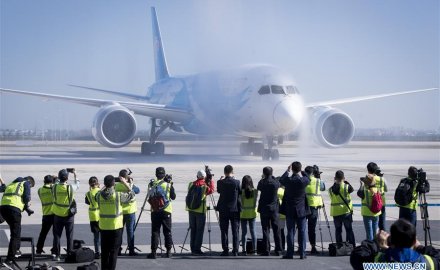 30-03-2020
30-03-2020
Asia’s huge aviation risk from Covid-19

 Insurance Alertss
Insurance AlertssAsia’s huge aviation risk from Covid-19
On March 26, the International Air Transport Association (IATA) urged Asia Pacific governments to provide emergency support for airlines as the Covid-19 outbreak forces the industry to fight for its survival.
“It’s apocalypse now for airlines. There is a small and shrinking window . . . to prevent a liquidity crisis from shuttering the industry,” said Alexandre de Juniac, director general and chief executive of IATA. Latest estimates from the association show that global air transport revenues for the year will fall to US$252 billion – 44% below 2019 figures, should severe travel restrictions keep up for three months. In Asia Pacific specifically, passenger revenue will decline by an estimated US$88 billion from the previous year.
“Standard airline hull and liability cover is not designed to offer airlines protection for non-damage business interruption [financial] losses arising from global health threats such as Covid-19.” John Rooley, Willis Towers Watson. For Asia’s aviation sector, this is set to bring unprecedented risks and disruptions. Airlines will be looking to see what loss of income from the pandemic can be recovered and what it will mean for market rates in the post-virus environment.
As Gary Moran, head of aviation, Asia at Aon’s Commercial Risk Solutions noted to InsuranceAsia News (IAN): “This ‘event’ has already superseded 9/11 as having the most significant impact on the aviation industry — and the whole ecosystem has felt this event (operators, insurers, brokers, lawyers, lessors, banks).”
What’s covered?
Airlines are now grounding their fleets due to a steep drop in demand, as a result of country-specific travel restrictions and new regulatory measures. As of early March, the anticipated fall in passenger numbers are as follows: China by 23%, Japan 12%, Singapore 10%, South Korea 14%; and Asia excluding the previously-listed countries by 11%.
Kenix Yuen, partner at dispute resolution law firm Gall, told IAN: “Complying with new regulations and guidelines by each country presents a huge challenge to air operators – including the aircraft leasing and logistics companies – and increases their legal risks as well. Failure and omissions to comply likely increases their liabilities to passengers contracting Covid-19 on board and may affect their own insurance protection.”
The risks and disruptions for the aviation sector could be manifold. The most visible might be a feedback loop scenario – wherein airlines are unable to receive cover for their business interruption losses, thus putting pressure on premiums collected by insurers. John Rooley, chief executive of aerospace at Willis Towers Watson, commented: “Standard airline hull and liability cover is not designed to offer airlines protection for non-damage business interruption [financial] losses arising from global health threats such as Covid-19. Airline management may wish to [re]consider the breadth of cover that may be provided by their current insurance programme.”
Moran added to IAN: “An airline usually purchases three to four specific aviation-related (re)insurance policies depending on their risk appetite and contractual obligations. Losses arising from business interruption — pandemic or otherwise — are not included within these covers. However, there are some options to help mitigate the burden.”
The final cost and impact from Covid-19 on the global aviation sector remains to be seen – but the fallout will be large. Policies are broadly designed for physical damage to aircrafts and associated equipment. In terms of Covid-19 liability, Rooley noted that it would be difficult for a passenger to transfer liability to the airline, if all guidelines on screening travellers were followed.
Rooley added: “An airline would only be liable for bodily injury to passengers and third parties if the sickness is proven to be the result of an incident onboard the aircraft, or during embarking and disembarking. There must be an external event that causes the person to contract the sickness, such as evidence that there was a failure to screen passengers in accordance with existing regulations.”
Losses and minimising future risk
While a spokesperson from Axa XL told IAN that it is “still too early to estimate the [financial] impact of this health crisis,” for the aviation sector, relief measures are coming from insurers.
The market has taken stock of the situation, and insurers are implementing temporary measures such as allowing airlines to put premium payments on hold while they contend with countless groundings of their planes.
Moran added: “In reacting to [Covid-19], we urge operators to speak with their brokers and look at how the impact can be mitigated in the short term. This involves provision of information on short and long-term business plans, fleet status and an overall view on the financial situation. Aon is involving the insurers in discussions with our clients so they can hear [firsthand business impact] — [allowing] us to negotiate ground risk only rates and returns with relief now, rather than at the end of the policy period (which is the norm).”
Meanwhile government stimulus measures are also on the way. For instance, the Hong Kong government released on March 23 a long-awaited HK$1 billion (US$128 million) support package for the sector, inclusive of airlines, its suppliers and more. Singapore’s sector will see S$750 million (US$525 million) in total, with S$350 million (US$245 million) specially designated for business relief.
The final cost and impact from Covid-19 on the global aviation sector remains to be seen – but the fallout will be large – and public and private sector strategies will need to be rethought to better minimise future financial risks. “There will [ultimately] be questions about what more could be done to transfer risk and the inevitable revenue losses in preparation for future outbreaks,” said Rooley.
Source: Insurance Asia News
